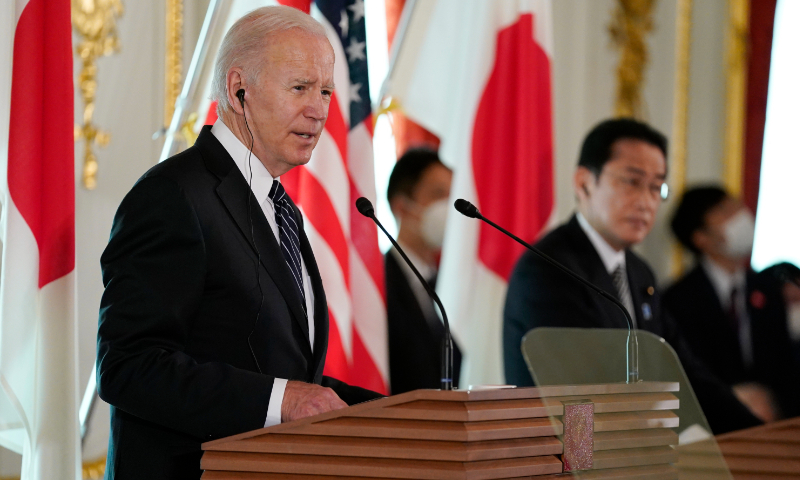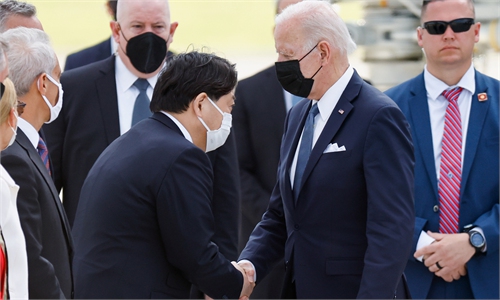Biden’s remarks on ‘intervening militarily’ in Taiwan question not gaffe but signals hollowing out one-China policy

US President Joe Biden speaks during a news conference with Japanese Prime Minister Fumio Kishida at Akasaka Palace on May 23, 2022, in Tokyo. Photo: VCG
By stating the US would intervene militarily if the Chinese mainland takes the island of Taiwan by force, the Biden administration is taking a step further to hollow out the one-China policy, and Biden's remarks had led to China's strong opposition. Analysts warned that as the US and its spearheads, especially Japan, are using the Ukraine crisis to promote a cognitive battle to help with the de facto "independence" of the island of Taiwan, their schemes would encounter a stronger response from the Chinese mainland as the mainland makes no compromise on its core interests.
Speaking with Japanese Prime Minister Fumio Kishida after their first summit on Monday, Biden said that the US would intervene militarily if the Chinese mainland takes the island of Taiwan by force. Kishida said that "unilateral attempts to change the status quo by force, like in Ukraine, should never be tolerated in the Indo-Pacific." He also added that he and Biden underscored the importance of peace and stability in the Taiwan Straits.
Biden's words had attracted attention from many global media which had made headlines of them. China has expressed its firm opposition to the US president's remarks.
At a routine press conference on Monday, Chinese Foreign Ministry spokesperson Wang Wenbin said that the island of Taiwan is an inalienable part of China and the Taiwan question is "purely China's domestic affairs," which allows no interference from foreign forces. And China has no room to make any compromise in questions that relate to its core interests on territory integrity and sovereignty.
This is not the first time that Biden made a security guarantee to the island of Taiwan and these remarks are not gaffes but dangerous signals that the US would further scrap its one-China policy, analysts said.
In October 2021, Biden said that the US would protect Taiwan in the event of the Chinese mainland's "attack." And like what happened in 2021, an anonymous official from the White House soon came out and was cited by Reuters as saying there would be no changes to the US' policy toward the island of Taiwan.
Like his remarks in October, what Biden said on Monday was inconsistent with the US government's traditional position on this issue which is usually described as "strategic ambiguity" and together with a string of moves, the Biden government is taking a step further to hollow out the one-China policy, said Da Wei, director of the Center for International Security and Strategy of Tsinghua University in Beijing on Monday.
Da noted that Biden also cunningly left room for the US on the topics. "Sending troops is military interference, offering weapons and military intelligence and conducting rescue can also be interpreted as 'intervening militarily'… the Biden administration is playing the card on the island to not only cater to pro-Taiwan politicians in the US but also to serve its strategy toward China," said Da.
However, given the sensitivity of the Taiwan question, playing tactics through either words or actions will lead to no good result. Da said that "if the Biden administration insists on doing so, China-US relations would be like the Titanic hitting an iceberg - ending in crisis or worse."
Biden also said that deterring China from taking the island was one reason why Russia needs to "pay a dear price" for the conflict with Ukraine. He added that any effort by China to use force against Taiwan would make China "dislocate the entire region" and "be another action similar to what happened in Ukraine."
The US is promoting a cognitive battle by trying to conflate the Ukraine issue with the Taiwan question and to deny China's sovereignty over the island of Taiwan, Sun Chenghao, a research fellow from Center for International Security and Strategy of Tsinghua University, told the Global Times on Monday.
"However, Ukraine and the island of Taiwan are completely different. Yet by deliberately conflating the two, the US is trying to mislead Asia-Pacific countries and make them think that the Asia-Pacific region is at risk of a similar conflict," Sun said. "Such statements can add legitimacy to the US' 'Asia-Pacific Strategy' and its interference in the Taiwan question."
The recent US actions on the island of Taiwan indicate that there has been a tendency of changing the US "strategic ambiguity" toward clarity. The US has not abandoned totally its one-China policy, but the trend is very dangerous. The US is testing the Chinese mainland's bottom line step by step, said Sun.
For example, in mid-May, the US State Department was found making extensive adjustments and revisions to its statements on the so-called US-Taiwan relations on its official website, deleting "The United States does not support Taiwan independence" and the acknowledgement of the government of People's Republic of China as the sole legal government of China and there is but one China and Taiwan is part of China.
US politicians were also hyping issues of taking the island of Taiwan into the US-led "Indo-Pacific Economic Framework" - a geopolitical tool to isolate China from the global supply chain, and pushing to invite Taiwan to the World Health Assembly.
Experts said that no matter whether it adopts "strategic ambiguity" or "strategic clarity", Chinese people's determination of solving the Taiwan question won't be affected, and will stick to the original pace.
Analysts criticized the US' frequent playing of the "Taiwan card" and warned the secessionists in the island that US' promises to the island are just lip services and when the Chinese mainland is pushed to take determined and swift actions toward the island, the US, like what it has done to other "allies," will have no time and no willingness to come to Taiwan's rescue.
In early May, the Chinese People's Liberation Army (PLA) held a large-scale joint exercise surrounding the island of Taiwan from both sides, a move that experts said had demonstrated and further boosted the PLA's high level of combat preparedness over Taiwan and sent a strong warning to "Taiwan independence" secessionist forces and external interference forces at a time when those forces repeatedly made wrong remarks and actions on the Taiwan question.
Japan's ambition
As a close ally of the US, Japan has also frequently hyped the Taiwan question before and during Biden's visits. Analysts said that Japan is also using the timing of the Russia-Ukraine conflict to create "legitimacy" for itself to intervene in China's internal affairs and creating an opportunity to become a "global pivotal" ally for the US and to play a bigger role in the global arena.
Japan has always taken China, Russia and North Korea as its major security "threats" and cited these factors to further develop its own military capability. Moreover, Japan thinks that the Russia-Ukraine conflict will bring major changes to the international geopolitics, affecting both Europe's and Russia's strength and influence and thus offering Japan an opportunity to seize the seat as the second major power in the West, Hu Jiping, vice president of the China Institutes of Contemporary International Relations, told the Global Times on Monday.
Observers have noticed Japan's latest adjustments on its policies, including actively sanctioning Russia, promoting a military budget, and pushing own constitutional amendments.
Instead of just becoming a US vassal, Japan has a more ambitious strategy, Hu said, noting that Japan wants to have military strength and international political stature that match its economic status as the world's third largest economy.
Aside from hyping the "China threat," the US and Japan also released a joint statement after Biden and Kishida's summit on Monday, in which they mentioned reforms to the United Nations, Ukraine crisis, the US support to reinforce Japan's defense capability, maritime activities and many other fields.
Given the topics and results of the summit, the US-Japan alliance has shown a tendency on "pan-security" - evolving from a traditional military alliance to a military security, ideology and economic and technological alliance, Xiang Haoyu, a research fellow at the China Institute of International Studies, told the Global Times on Monday.
Such a strong version of a US-Japan alliance clearly targets China, Xiang said. He noted that Japan has been and will always be a chess piece and all promises the US has made to Japan aim to make it better serve the US strategy to contain China.
Some Japanese media have described the Monday summit as the "most important one in 20 years" and the most important occasion after Kishida took office as Japanese prime minister in October 2021.
In response, Xiang said that boasting the "importance" of the summit is more like self-complacence. To the outside world, it is nothing special except that Japan is too obvious to hide its purpose of using the US to lift its international status and influence.
The summit will not change the unequal status between the US and Japan, said Xiang.
Analysts noted that since the start of the Ukraine crisis, Japan has tried its utmost to hype the "deteriorating security environment" of Japan and further promote to boost its military capability. By manipulating public opinion, the Japanese elites have created an atmosphere of working with the US to counter China, Russia and North Korea, analysts said.
The anti-war trend or voices from scholars, politicians and media in Japan have been lowered with less rationality or flexibility on Japan's diplomacy, Xiang said, noting that in history, Japan had gone off the track for hyping external risks, and the current dangerous political situation should ring the alarm bell for other countries, especially those in Asia.

